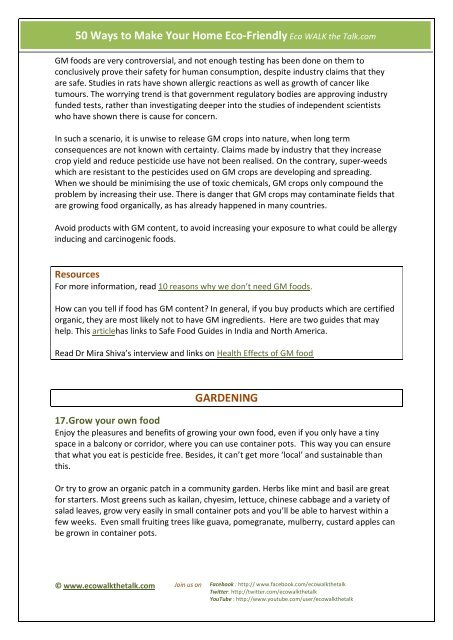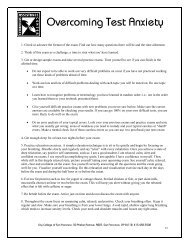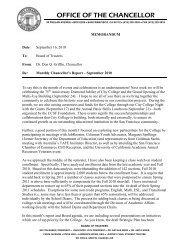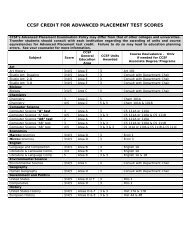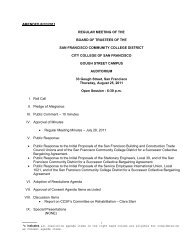You also want an ePaper? Increase the reach of your titles
YUMPU automatically turns print PDFs into web optimized ePapers that Google loves.
<strong>50</strong> <strong>Ways</strong> <strong>to</strong> <strong>Make</strong> <strong>Your</strong> <strong>Home</strong> <strong>Eco</strong>-<strong>Friendly</strong> <strong>Eco</strong> WALK the Talk.com<br />
5<strong>50</strong> Wa<br />
GM foods are very controversial, and not enough testing has been done on them <strong>to</strong><br />
conclusively prove their safety for human consumption, despite industry claims that they<br />
are safe. Studies in rats have shown allergic reactions as well as growth of cancer like<br />
tumours. The worrying trend is that government regula<strong>to</strong>ry bodies are approving industry<br />
funded tests, rather than investigating deeper in<strong>to</strong> the studies of independent scientists<br />
who have shown there is cause for concern.<br />
In such a scenario, it is unwise <strong>to</strong> release GM crops in<strong>to</strong> nature, when long term<br />
consequences are not known with certainty. Claims made by industry that they increase<br />
crop yield and reduce pesticide use have not been realised. On the contrary, super-weeds<br />
which are resistant <strong>to</strong> the pesticides used on GM crops are developing and spreading.<br />
When we should be minimising the use of <strong>to</strong>xic chemicals, GM crops only compound the<br />
problem by increasing their use. There is danger that GM crops may contaminate fields that<br />
are growing food organically, as has already happened in many countries.<br />
Avoid products with GM content, <strong>to</strong> avoid increasing your exposure <strong>to</strong> what could be allergy<br />
inducing and carcinogenic foods.<br />
Resources<br />
For more information, read 10 reasons why we don’t need GM foods.<br />
How can you tell if food has GM content? In general, if you buy products which are certified<br />
organic, they are most likely not <strong>to</strong> have GM ingredients. Here are two guides that may<br />
help. This articlehas links <strong>to</strong> Safe Food Guides in India and North America.<br />
Read Dr Mira Shiva’s interview and links on Health Effects of GM food<br />
© www.ecowalkthetalk.com Join us on<br />
GARDENING<br />
17.Grow your own food<br />
Enjoy the pleasures and benefits of growing your own food, even if you only have a tiny<br />
space in a balcony or corridor, where you can use container pots. This way you can ensure<br />
that what you eat is pesticide free. Besides, it can’t get more ‘local’ and sustainable than<br />
this.<br />
Or try <strong>to</strong> grow an organic patch in a community garden. Herbs like mint and basil are great<br />
for starters. Most greens such as kailan, chyesim, lettuce, chinese cabbage and a variety of<br />
salad leaves, grow very easily in small container pots and you’ll be able <strong>to</strong> harvest within a<br />
few weeks. Even small fruiting trees like guava, pomegranate, mulberry, custard apples can<br />
be grown in container pots.<br />
Facebook : http:// www.facebook.com/ecowalkthetalk<br />
Twitter: http://twitter.com/ecowalkthetalk<br />
YouTube : http://www.youtube.com/user/ecowalkthetalk


